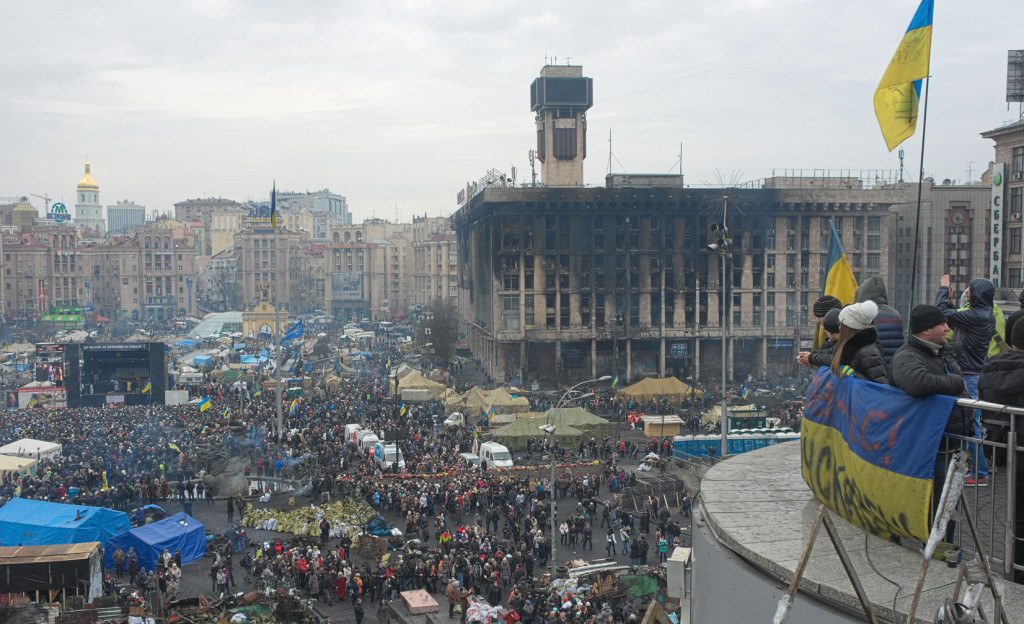Since Ukrainian President Viktor Yanukovych was ousted from power, Western observers have been speculating at Russian President Vladimir Putin’s myriad motives and options for determining Ukraine’s future. Russia’s actions to mobilize troops in the Crimea this past weekend injected new energy into the debate. In the World Affairs Journal, Alexander J. Motyl wrote that Putin would have to lose “all his geopolitical marbles” to act aggressively in the Crimea. More recently, German Chancellor Angela Merkel relayed to Obama that Vladimir Putin is “in another world.”
Despite such talk, Putin isn’t as crazy as his actions in Ukraine have led many to believe. On the contrary, Russia’s actions are based on logic — albeit logic that is warped and unsuited to a post-Soviet world order. Russia’s actions in Ukraine can be interpreted as a response to perceived threats to Russia’s national security. Most obviously, the Crimea is the home to Russia’s Black Sea Fleet. In addition, the Russian government has expressed concerns about the safety of Ukraine’s ethnic Russians and Russian speakers in general.
Contrary to the fears of some former Soviet republics, Russia’s intervention in Ukraine is not the beginning of a quest to reclaim all of its lost Soviet territory. Russia will most likely not try to annex either Poland or Lithuania. First and foremost, Ukraine itself holds unique historic significance to Russia: the Christianization of the Russian state is traced to Kiev in the 9th century A.D., and throughout Russian history Ukraine has maintained a privileged cultural connection to Russia. Secondly, these former Soviet republics are NATO members. These fears ignore Russia’s blatant fears of war with NATO. Though, if the Ukraine crisis follows the template set by Russia’s 2008 war with Georgia, NATO and the US, won’t risk war with Russia over a non-NATO member state.
And, as Russian newspaper headlines show, the Kremlin’s perspective on the Ukraine crisis is quite transparent. Russian news sites post headlines justifying Russian intervention on numerous grounds. Some articles include quotations linking Ukrainian nationalists to terrorists and neo-Nazis. In addition, this graphic shows Ukrainian cities in which protesters raised Russian flags over government buildings.
Generally speaking, Russian-based news outlets such as RT (formerly Russia Today) are not a bastion of unbiased reporting. Speaking in an interview with RT editor-in-chief Margarita Simonyan in June 2013, Putin admitted that the state-funded channel “cannot help but reflect the Russian government’s official position on the events in our country and the rest of the world.” Geared towards foreign consumption, the RT is a deliberate effort by the Russian government to rival other major news networks with a Kremlin-friendly perspective. Such sites are useful when trying to understand the official line. That’s not to say that the Kremlin viewpoint itself is accurate.
As many politicians have pointed out, Russia’s recent policy toward Ukraine has been driven by balance of power formulations left over from the Cold War era. The Cold War lingers in the more recent cultural memory of both sides, and for good reason. The current Russian leadership is scarred by memories of the Soviet collapse that left the Russian Federation reeling, and the West, i.e. NATO and the US, still poses an existential threat to Russia as it reemerges as a functional state.
As recently as 2013, Russia conducted military training exercises geared toward a NATO attack. So, fears of losing Ukraine first to the E.U. and then to NATO membership developed out of preexisting Russian security concerns and a perceived necessity to leverage a Russian sphere of influence against United States hegemony. Continued military activity fortifies the Kremlin’s understandings of Russia’s military and geostrategic influence, especially as it sees the West encroaching into Russia’s privileged sphere of interest. Ultimately, one of Russia’s broadest political concerns is a return to global power significance.
Russian maneuvers in the Crimea may thwart Russia’s long term goals of international leadership. Perhaps most immediately, a Western move to eject Russia from the G-8 would reverberate within the Russian government. Membership in the G-8, unlike membership in the G-20, is determined by economic might in consideration with a sufficient Human Development Index, a composite statistic of education and life expectancy compared to income. China and Brazil, other powerful world economies who are included in the G-20, have been denied G-8 membership for failure to meet these criteria. As such, G-8 membership, along with the privilege to use Sochi to host the 40th annual G-8 summit scheduled for June 2014, hold symbolic significance to a country that consistently considers itself more culturally connected to its Western than its Eastern neighbors. Russia’s expulsion from the G-8 would hurt Russia’s pride, though clearly Russia may be willing to sacrifice symbolic, diplomatic influence for solid geostrategic dominance over Ukraine.
Russia’s decision to intervene militarily in Ukraine appears to defy rational politics. An analysis of Russian news and geopolitical strategy, however, reveals something different. Russia’s policy toward Ukraine has been shaped by centuries of close Russo-Ukrainian interaction, as well as Soviet-era fears of attack by NATO forces. To Putin, the crisis in Ukraine is an opportunity to secure a vital strategic interest, while also demonstrating Russian power. The actual costs may only become apparent as the crisis unfolds.
_________________________
Jorja Knauer is a senior at Barnard College, where she is writing her senior thesis on violence against journalists in Putin’s Russia. Her academic writing has been published in The Birch, Columbia University’s undergraduate Slavic studies journal.

